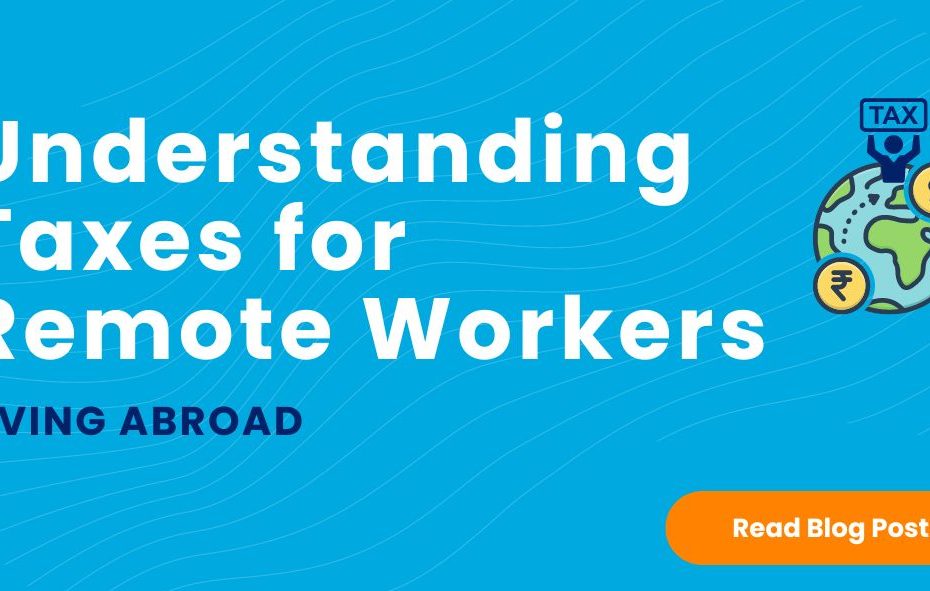Working abroad as a foreign worker can be an exciting opportunity, but it also comes with a lot of responsibilities, including understanding tax laws. The tax implications of working abroad can be complex and confusing, and it is crucial to understand the tax laws in both your home country and the country where you are working. Failure to comply with tax laws can result in serious consequences, including fines, penalties, and even legal action.
This blog post will provide an outline of the tax implications for foreign workers when working abroad. It will cover key topics such as tax residency, taxation of income, social security taxes, and tax planning. By the end of this post, readers should have a better understanding of their tax obligations when working abroad and the steps they can take to ensure compliance with tax laws
Tax Residency
Tax residency refers to the country where an individual is liable to pay taxes on their income, based on the tax laws of that country. Tax residency is determined by several factors, including the duration of stay, the purpose of stay, ties to the country, and the individual’s intention to remain in the country.
It’s important to note that tax residency is not the same as citizenship. Citizenship refers to the country of a person’s nationality, whereas tax residency refers to the country where they are obligated to pay taxes on their income. A person can be a citizen of one country and a tax resident of another country.
Different countries have different rules for determining tax residency. For example, in the United States, individuals are considered tax residents if they meet either the green card test or the substantial presence test. The green card test applies to individuals who hold a valid green card, while the substantial presence test applies to individuals who have been physically present in the U.S. for a certain number of days over three years.
In the United Kingdom, individuals are considered tax residents if they meet either the automatic UK test or the sufficient ties test. The automatic UK test applies to individuals who spend 183 days or more in the UK in a tax year, while the sufficient ties test takes into account various factors such as family ties, accommodation and work in the UK.
Understanding one’s tax residency status is crucial when working abroad. It determines which country has the right to tax your income, and failing to comply with tax laws can result in serious consequences. It’s important to research and understands the tax residency rules in both your home country and the country where you will be working to ensure compliance with tax laws.
Taxation of Income
Foreign workers may be subject to taxation on their income in both their home country and the host country where they are working.
In the home country, foreign workers may be required to pay taxes on their global income, including the income earned abroad. However, many countries have tax treaties with other countries to avoid double taxation.
Under these tax treaties, foreign workers may be able to claim foreign tax credits or exclusions to reduce their tax liability in their home country.
In the host country, foreign workers may be required to pay taxes on the income earned in that country. The tax laws of the host country will determine the tax rates and the applicable deductions or exemptions.
In some cases, foreign workers may be eligible for tax incentives or exemptions, such as special tax rates for expatriates or tax-free allowances for certain types of income.
Double taxation occurs when the same income is taxed twice, once in the host country and again in the home country. This can result in a higher tax liability and can be a significant burden for foreign workers.
Would You Like To Apply For This Jobs/Sponsorship?
Enter Your Email Address HERE & You Will Receive a Notification About Your Application. If it shows "Subscribed" CLICK HERE to follow on Telegram for updatesHowever, double taxation can be avoided through tax treaties between countries. These treaties typically provide for the elimination or reduction of double taxation by allowing foreign tax credits, exclusions, or deductions.
Foreign workers need to understand the tax laws of both their home country and the host country to ensure compliance and minimize their tax liability. It’s also important to keep accurate records of income earned and taxes paid in both countries to claim any applicable foreign tax credits or deductions. Seeking professional advice can also help navigate the complex tax laws when working abroad.
Social Security Tax
Social Security taxes are taxes paid to fund social security programs, such as retirement, disability, and survivor benefits. In many countries, both employees and employers are required to pay social security taxes on the employee’s income. These taxes are typically calculated as a percentage of the employee’s earnings, up to a certain limit.
When working in a foreign country, social security taxes may still need to be paid, but the rules and requirements can vary depending on the country. In some cases, foreign workers may be exempt from paying social security taxes in the host country if they are already paying into a social security program in their home country. However, in other cases, foreign workers may be required to pay social security taxes in both their home country and the host country.
Many countries have social security agreements with other countries to avoid double social security taxation. These agreements, also known as totalization agreements, typically provide for the coordination of social security taxes between the two countries, so that workers do not pay social security taxes in both countries for the same work.
Foreign workers need to understand the social security tax laws of both their home country and the host country to ensure compliance and avoid double taxation. Seeking professional advice can help navigate the complex social security tax laws when working abroad.
Tax Planning
Foreign workers can take several steps to minimize their tax liabilities when working abroad:
Understand tax residency rules: As discussed earlier, understanding tax residency rules is crucial to determining where one must pay taxes. By doing so, foreign workers can identify whether they need to pay taxes in both their home and host countries and can plan accordingly.
Take advantage of tax treaties: Many countries have tax treaties with other countries to avoid double taxation. Foreign workers can take advantage of these treaties to reduce their tax liabilities by claiming foreign tax credits or exclusions.
Use tax-efficient savings options: Foreign workers can use tax-efficient savings options, such as retirement accounts and investment accounts, to reduce their tax liabilities. These accounts typically provide tax-deferred growth or tax-free withdrawals, which can be beneficial for long-term savings.
Claim eligible deductions and credits: Foreign workers should be aware of the deductions and credits that they are eligible for in both their home country and the host country. By doing so, they can reduce their taxable income and lower their tax liability.
It’s also important for foreign workers to keep proper records of their income and taxes paid in both their home country and the host country. This can help ensure compliance with tax laws and can help claim foreign tax credits or exclusions. Seeking professional advice from tax professionals can also help navigate the complex tax laws when working abroad.
Failing to comply with tax laws in a foreign country can have serious consequences, such as fines, penalties, and even legal action. It’s important for foreign workers to understand the tax laws of both their home country and the host country and to take the necessary steps to ensure compliance. By doing so, foreign workers can minimize their tax liabilities and avoid any potential legal issues.
Conclusion
In summary, this blog post discussed the tax implications for foreign workers when working abroad. We explained the concept of tax residency, how income earned by foreign workers is taxed in their home country and the host country, the impact of social security taxes, and tax planning tips to minimize tax liabilities. We also highlighted the importance of keeping proper records, seeking professional advice, and complying with tax laws to avoid any potential legal issues.
Foreign workers must understand tax laws when working abroad to avoid potential tax pitfalls and legal issues. They should research and seek professional advice to determine their tax residency status, understand tax treaties, and take advantage of tax-efficient savings options. By doing so, foreign workers can minimize their tax liabilities and avoid any potential legal issues.
In conclusion, foreign workers must be aware of their tax obligations in both their home country and the host country. They should keep proper records and seek professional advice to ensure compliance with tax laws. Taking the necessary steps can minimize tax liabilities and ensure a smooth working experience abroad.







I’m interested to work in USA if I can get a sponsorship